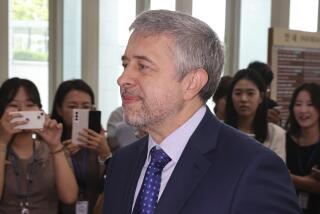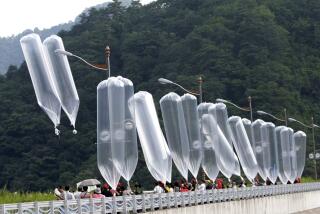Bush Urges Caution in N. Korea Dealings
WASHINGTON — President Bush told South Korean President Kim Dae Jung on Wednesday that he is skeptical about North Korea’s commitment to current and future arms deals and said he won’t soon reopen negotiations with the Communist regime in Pyongyang to curb its long-range missile program.
Bush, in his first talks as president with an Asian leader, said all parties dealing with the reclusive regime of Kim Jong Il must be “wise and strong,” a signal of the administration’s wariness about relations with the Cold War holdover.
“When you make an agreement with a country that is secretive,” Bush said, “how are you aware as to whether or not they are keeping the terms of the agreement?”
The talks with South Korea’s Kim, described as “frank and forthright,” were in stark contrast to earlier, more upbeat meetings Bush held with the leaders of Mexico, Canada and Britain.
Kim Dae Jung, who won the Nobel Peace Prize last year for his “sunshine policy” designed to end the North’s isolation and eventually reunify the Korean peninsula, said Bush had been very frank and honest in sharing his perceptions about the North Korean regime.
“This is very important for me to take home and to consider,” the South Korean leader said.
U.S. support is critical to the success of South Korea’s diplomatic initiative. Because of growing uncertainty at home about his sunshine policy, which has encountered numerous delays and obstacles since last year’s historic summit between the leaders of the two Koreas, Kim had hoped for a strong show of unity and support, according to U.S. experts and South Korean diplomats.
U.S. involvement is considered vital because Washington has taken the lead in negotiating deals to curb North Korea’s weapons programs, which pose a security threat to South Korea and the region.
Bush said he hopes to resume talks with North Korea at some point.
“I do have some skepticism about the leader of North Korea, but that’s not going to preclude us from trying to achieve the common objective,” he said.
But he warned that any new deal on missiles would require complete verification.
“I am concerned that the North Koreans are shipping weapons of mass destruction around the world,” he said. “We want to make sure their ability to develop and spread weapons of mass destruction was in fact stopped.”
The president’s comments triggered an immediate round of criticism from U.S. experts and congressional sources.
“The rhetoric is what worries me,” said Sen. Joseph R. Biden Jr. (D-Del.) “My experience with folks in the Far East is that they aren’t very experienced at reading our nuanced language. I fear this will escalate things into charges from North Korea about the ‘running dogs of the West’ abandoning their promises. This is not off to a good start.”
The tone of Bush’s comments seemed to contrast with remarks made just a day earlier by Secretary of State Colin L. Powell, who praised the South Korean sunshine policy and pledged to continue the mediation begun during the Clinton administration.
“We are not avoiding North Korea--quite the contrary,” Powell said Tuesday. “We do plan to engage with North Korea to pick up where President Clinton left off. We think we have a lot to offer that regime, if they will act in ways that we think are constructive.”
But on Wednesday, Powell came out of the meeting and told reporters that any suggestion that imminent negotiations were about to take place was “not the case.”
“We’ll be formulating our policies and in due course decide at what pace and when we engage, but there is no hurry,” he said.
The United States and North Korea have ratcheted up the rhetoric over negotiations since the Bush administration took office six weeks ago. Twice in the last two weeks, North Korea has warned that it might soon take two drastic steps--scrapping its moratorium on long-range missile tests and reviving a nuclear energy program--in the absence of follow-through by the U.S.
In a statement Saturday, Pyongyang said it would be difficult to “indefinitely keep such measures in force.”
The North Korean warnings were made in response to statements by Bush administration officials about their intention to review the negotiations begun at Pyongyang’s initiative during the waning days of the Clinton administration.
Experts on Korea are concerned that what may be a mix of posturing by an isolated North Korean regime and tough talk by a new U.S. administration could undermine the negotiations.
“I certainly understand that Bush needs time to decide how to proceed. And the North understands that too,” said Wendy Sherman, special advisor to Clinton on North Korea. “But there is a window of opportunity, and usually where there is a window in diplomacy, one ought to seize it.”
The most urgent need is for the United States and South Korea to agree on a common approach, said Patrick Cronin, an Asia analyst and director of research at the U.S. Institute of Peace in Washington.
“That window hasn’t been closed in a single day, but if Kim goes back to Seoul without an assurance that Bush fully supports his policy, then it puts at risk the entire diplomacy of the past couple of years on missiles and even the last seven years since the agreed framework on nuclear issues,” he said.
Playing the role of “bad cop” with North Korea may be effective in pressuring Pyongyang to prove its intentions, perhaps with a gesture to reduce the military threat to South Korea, Cronin said. Although the Korean War ended half a century ago, the two sides are still technically at war and have tens of thousands of troops deployed near their border.
The Bush administration also faces the danger that a hard-line position will make North Korea more rigid in dealing with the outside world, Cronin added.
In the meantime, there is a danger that North Korea may end its moratorium on testing long-range missiles.
“We’ve had a moratorium on missile tests for two years, and it’s unilateral,” said Samuel R. “Sandy” Berger, Clinton’s national security advisor. “They’ve always said it would continue as long as they were engaged with the United States in serious discussions about the future of the missile program and future of our relations.”
More to Read
Sign up for Essential California
The most important California stories and recommendations in your inbox every morning.
You may occasionally receive promotional content from the Los Angeles Times.










